2018暑期七升八英语补习资料
- 格式:doc
- 大小:210.50 KB
- 文档页数:28
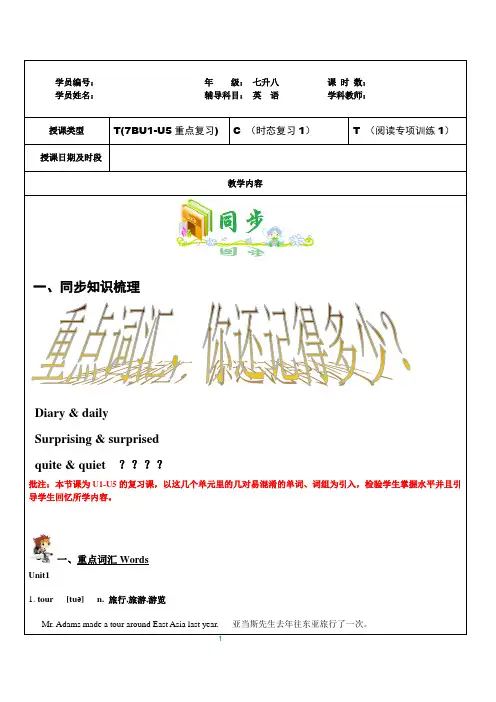
学员编号:年级:七升八课时数:学员姓名:辅导科目:英语学科教师:授课类型T(7BU1-U5重点复习) C (时态复习1)T (阅读专项训练1)授课日期及时段教学内容一、同步知识梳理Diary & dailySurprising & surprisedquite & quiet ????批注:本节课为U1-U5的复习课,以这几个单元里的几对易混淆的单词、词组为引入,检验学生掌握水平并且引导学生回忆所学内容。
一、重点词汇WordsUnit11. tour [tuə] n. 旅行,旅游,游览Mr. Adams made a tour around East Asia last year. 亚当斯先生去年往东亚旅行了一次。
【拓展】副词: comfortably【反义词】uncomfortable批注:comfortable也是本单元的重点词汇,需掌握其拼写以及常见的词性转换,如adv和反义词。
3. happiness解析:n. 幸福,快乐,愉快例句:His marriage is full of happiness.他的婚姻生活很幸福。
【词形变换】副词: happily反义:unhappy例句:John lives happily because he makes full use of time to study.约翰生活得快乐因为他善用他的时间学习。
批注:词性转换的易考词,happy的名词、形容词、副词以及反义词都需掌握。
4. disappear解析:v. 消失例句:My wallet disappeared from the table.我放在桌子上的钱包不见了。
【词性转换】名词: disappearance反义词:appear批注:注意其拼写要双写p,以及需掌握其反义词appear和名词形式,词性转换中常出现。
二、重点句型1. I’d like to see ‘ The Stupid Clown’.Would like 想要;愿意+n./ to do.如:I'd like two sweaters for my daughters. 我想给我的女儿们买两件毛衣。
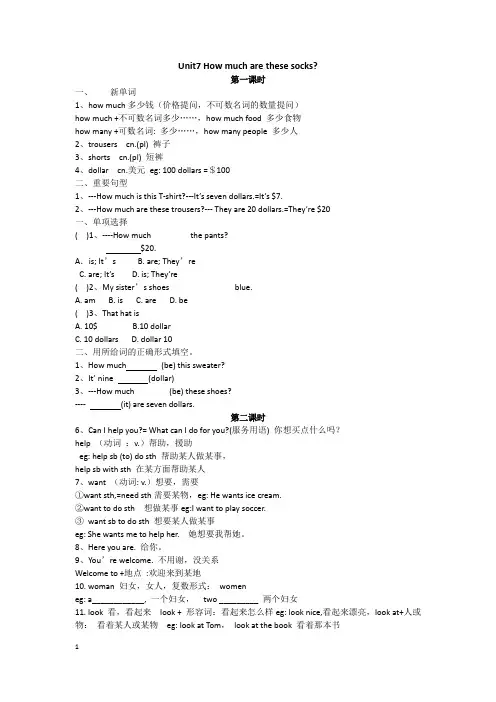
Unit7 How much are these socks?第一课时一、新单词1、how much多少钱(价格提问,不可数名词的数量提问)how much +不可数名词多少……,how much food 多少食物how many +可数名词: 多少……,how many people 多少人2、trousers cn.(pl) 裤子3、shorts cn.(pl) 短裤4、dollar cn.美元eg: 100 dollars =$100二、重要句型1、---How much is this T-shirt?---It’s seven dollars.=It’s $7.2、---How much are these trousers?--- They are 20 dollars.=They’re $20一、单项选择( )1、----How much the pants?$20.A.is; It’s B. are; They’reC. are; It’sD. is; They’re( )2、My sister’s shoes blue.A. amB. isC. areD. be( )3、That hat isA. 10$B.10 dollarC. 10 dollarsD. dollar 10二、用所给词的正确形式填空。
1、How much (be) this sweater?2、It’ nine (dollar)3、---How much (be) these shoes?----(it) are seven dollars.第二课时6、Can I help you?= What can I do for you?(服务用语) 你想买点什么吗?help (动词:v.)帮助,援助eg: help sb (to) do sth 帮助某人做某事,help sb with sth 在某方面帮助某人7、want (动词: v.)想要,需要①want sth,=need sth需要某物,eg: He wants ice cream.②want to do sth 想做某事eg:I want to play soccer.③want sb to do sth 想要某人做某事eg: She wants me to help her. 她想要我帮她。
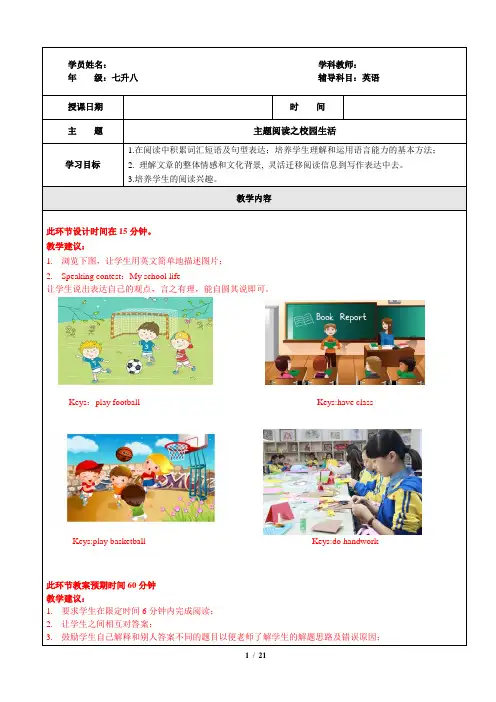
此环节设计时间在15分钟。
教学建议:1.浏览下图,让学生用英文简单地描述图片;2.Speaking contest:My school life让学生说出表达自己的观点,言之有理,能自圆其说即可。
Keys:play football Keys:have classKeys:play basketball Keys:do handwork此环节教案预期时间60分钟教学建议:1.要求学生在限定时间6分钟内完成阅读;2.让学生之间相互对答案;3.鼓励学生自己解释和别人答案不同的题目以便老师了解学生的解题思路及错误原因;4.让错误较多的学生总结错误原因及注意事项。
5.短语及句型学习Reading—School Life【知识梳理1】回答问题解题方法和技巧知识点1.回答问题考点分析:1)细节与事实:往往考查事件发生的时间、地点、人物、发展过程和结局等。
2)结论或推论:答案往往无所谓正确与错误之别,而是须读懂通篇文章,弄懂作者的写作要旨,按照文章的内容和逻辑关系,做出符合原文逻辑或主旨的结论或推论。
知识点2.回答问题解题方法:1)客观信息的答案一般都可以在原文中找到。
在答题时要仔细核对原文,注意问题的人称、时态和语态与原文是否一致,如果答题时需要语言重组,则应尤为慎重。
2)开放性的问题源于文章,答题时不能天马行空,要符合逻辑。
语言不宜过于复杂,能说明观点即可。
【例题精讲】例1.More Youth Use Smartphones As Route to WebKeep computers in a common area so you can monitor what your kids are doing. It's a long standing directive for online safety —but one that's quickly becoming moot as more young people have mobile devices, often with Internet access.A new report from the Pew Internet & American Life Project finds that 78 percent of young people, ages 12 to 17, now have cellphones. Nearly half of those are smartphones, a share that's increasing steadily — and that's having a big effect on how, and where, many young people are accessing the Web.The survey, released Wednesday, finds that one in four young people say they are "cell-mostly" Internet users, a percentage that increases to about half when the phone is a smart phone. In comparison, just 15 percent of adults said they access the Internet mostly by cellphone."It's just part of life now," says Donald Conkey, a high school sophomore inWilmette, Ill., just north of Chicago, who is among the many teens who havesmartphones. "Everyone's about the same now when it comes to their phones —they're on them a lot."He and other teens say that if you add up all the time they spend using appsand searching for information, texting and downloading music and videos, they'reon their phones for at least a couple hours each day —and that time is onlyincreasing,According to the survey, older teen girls, ages 14 to 17, were among the most likely to say their phones were the primary way they access the Web. And while young people in low-income households were still somewhat less likely to use the Internet, those who had phones were just as likely —and in some cases, more likely —to use their cellphones as the main way they access the Web.It means that, as this young generation of "mobile surfers" grows and comes of age, the way corporations do business and marketers advertise will only continue to evolve, as will the way mobile devices are monitored.Already, many smartphones have restriction menus that allow parents to block certain phone functions, or mature content. Cellphone providers have services that allow parents to see a lot of their children's texts. And there are a growing number of smartphone applications that at least claim to give parents some level of control on a phone's Web browser, though many tech experts agree that these applications can be hit-or-miss.Despite the ability to monitor some phone activity, some tech and communication experts question whether surveillance, alone, is the best response to the trend.Some parents take a hard line on limits. Others, not so much, says Mary Madden, a senior researcher at Pew who co-authored the report."It seems like there are two extremes. The parents who are really locking down and monitoring everything — or the ones who are throwing up their hands and saying, 'I'm so overwhelmed,'" Madden says.WORD BANKa)monitor v. 监督,监控b)access n. 入口,接近v. 使用,获取c)evolve v. 演变,发展d)claim v声称e)surveillance n. 监督【长难句解析】Nearly half of those are smartphones, a share that's increasing steadily — and that's having a big effect首字母考查我们在充分理解短文的基础上将单词拼写出来,并且单词形式合理,符合语法规范,符合短文意思需要。

初一升初二暑假衔接班英语资料2班级______________ 姓名_____________第一部分:语法突破---代词(人称、物主和不定代词)二.物主代词1. 物主代词分为形容词性物主代词和名词性物主代词。
2. 用法:形物代表示“...的”后需接名词;名物代本身已包含名词之意,不需再加名词。
(有名则形,无名则名)三.练习题用所给代词的正确形式填空1. Cara, this is (I) best friend, Mary.2. Thanks for helping . (we)3. This isn’t pen. is on the desk. (he)4. Is this Linda’s pencil-box? No, is very new. (she)5. Don’t worry. Let (I) help . (you)6. Where are ? I can’t find . Let’s call parents. (they)7. is a boy. name is Mike. Mike’s friends like very much. (he)8. teacher is Miss. Xiong. She teaches English. (we)9. Can you help with math? (I)10. Geography is difficult for . (they)11. Each of has a computer. (we)(四)、与“一些”有关的不定代词:some, anysome 用法:any 用法:练习:If you have no paper, I’ll give you ______________.Are there ______________ students in the classroom?Why not buy ______________ flowers for her?China is larger than ____________ country in Africa.Would you like water?( ) 1. -- Would you like ___________ to eat? -- Thanks, please.A. anythingB. somethingC.anyoneD. someone( )3. Tom said he would tell us _________.A.surprising something B.surprised somethingC.something surprising D.something surprised( )4. We didn’t find________ in the picture.A.interesting anything B.nothing interestingC.anything interesting D.interesting something( )5. Someone with a pair of big eyes in our class ___________ from Shanghai.eB. comesC.leaveD. leaves五、与“一个”有关的不定代词:it, one, that1. it指上文出现过的同一事物,复数用they/ them2. one 泛指同类事物单数可数名词(同类中的一个),复数用ones3. that特指同类事物单数可数名词(相当于the one)或不可数名词,其复数为those。
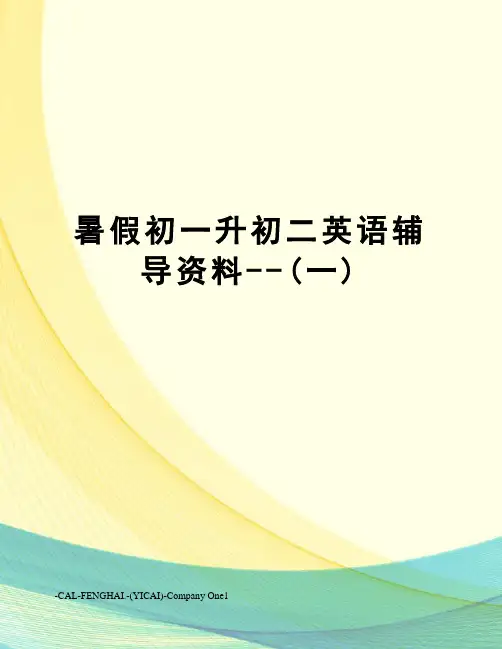
暑假初一升初二英语辅导资料--(一)-CAL-FENGHAI.-(YICAI)-Company One1暑假初一升初二英语辅导资料(一)grammer focus: past simpleⅠ.一般过去时的概念:一般过去时表示过去某个时间发生的动作或存在的状态。
常和表示过去的时间状语连用,如:last year,yesterday,just now,a moment ago 等;也可以表示过去经常反复发生的动作,常和often ,always等频率问题。
例如:1.I saw him in the street yesterday.2.Li Mei always went to school on foot last year.一般过去时的构成:动词过去式的构成:1.规则动词过去式的构成有四条:a.一般在动词原形末尾直接加ed 如:look-lookedb.以不发音的字母e结尾的动词,去e再加ed,如live-livedc.末尾只有一个辅音字母的重读闭音节,先双写这个辅音字母再加ed,如:stop-stoppedd末尾是辅音字母加y结尾的动词,先变y为i,然后再加ed,如:study-studiede 不规则动词的过去式需特殊记忆。
如,has-had一般过去时的几种句型:肯定句结构为:主语+动词的过去式+其他如:He went to the toy store yesterday.否定句结构为:主语+didn’t +动词原形+其他。
如:He didn’t go to thetoy store yesterday.一般疑问句的构成:Did +主语+动词原形+其他.如:Did you go to Beijing last week Yes, we did. No, we didn’t .特殊疑问句的构成:疑问词+一般疑问句。
如 what did you do last night一般过去时的口诀:一般过去时并不难,表示过去动作,状态记心间。
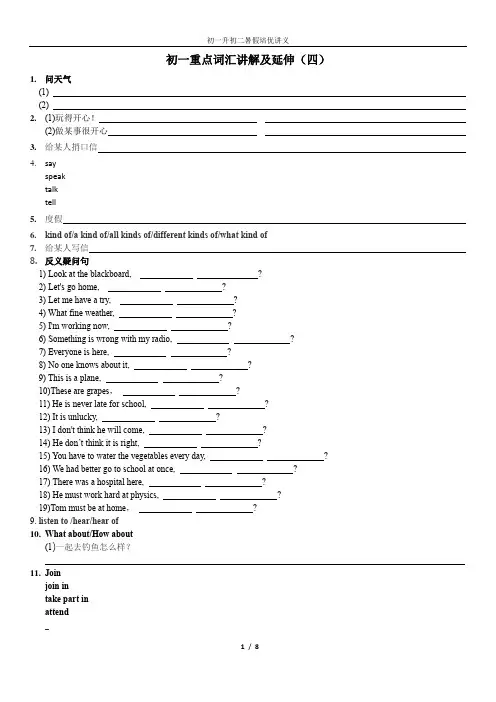
初一重点词汇讲解及延伸(四)1.问天气(1)(2)2.(1)玩得开心!(2)做某事很开心3.4.sayspeaktalktell5.6.kind of/a kind of/all kinds of/different kinds of/what kind of7.给某人写信8.反义疑问句1) Look at the blackboard, ?2) Let's go home, ?3) Let me have a try, ?4) What fine weather, ?5) I'm working now, ?6) Something is wrong with my radio, ?7) Everyone is here, ?8) No one knows about it, ?9) This is a plane, ?10)These are grapes,?11) He is never late for school, ?12) It is unlucky, ?13) I don't think he will come, ?14) He don’t think it is right, ?15) You have to water the vegetables every day, ?16) We had better go to school at once, ?17) There was a hospital here, ?18) He must work hard at physics, ?19)Tom must be at home,?9.listen to /hear/hear of10.What about/How about(1)一起去钓鱼怎么样?11.Joinjoin intake part inattend12.at+时刻13.what time/when14.exercise15.其他任意一个学生重要时态复习一般现在时【定义】一般现在时表示现在经常反复发生的动作、存在的状态或习惯性的动作。
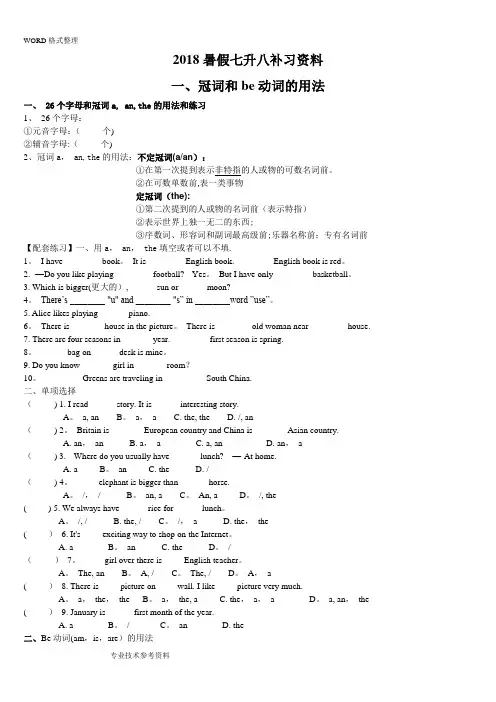
2018暑假七升八补习资料一、冠词和be动词的用法一、26个字母和冠词a, an,the的用法和练习1、26个字母:①元音字母:(_____个)____________________________________________________②辅音字母:(_____个)2、冠词a, an,the的用法:不定冠词(a/an):①在第一次提到表示非特指的人或物的可数名词前。
②在可数单数前,表一类事物定冠词(the):①第二次提到的人或物的名词前(表示特指)②表示世界上独一无二的东西;③序数词、形容词和副词最高级前;乐器名称前;专有名词前【配套练习】一、用a, an, the填空或者可以不填.1。
I have ________ book。
It is ________ English book. ________ English book is red。
2. -—Do you like playing ________ football? --Yes。
But I have only ________ basketball。
3. Which is bigger(更大的), ______sun or ______moon?4。
There’s ________ "u" and ________ "s” in ________word ”use”。
5. Alice likes playing ______ piano.6。
There is _______ house in the picture。
There is ________old woman near_________house.7. There are four seasons in _______year. ________ first season is spring.8。
______bag on ______desk is mine。
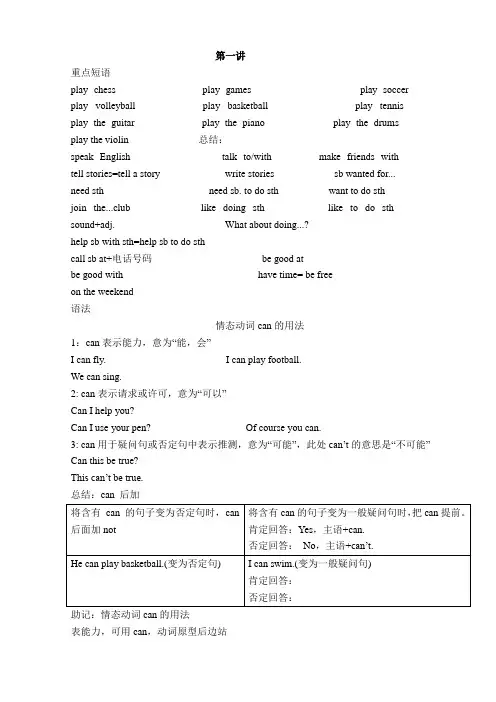
第一讲重点短语play chess_________ play games___________ play soccer________ play volleyball_________ play basketball__________ play tennis_________ play the guitar_________ play the piano_______ play the drums__________ play the violin________ 总结:____________speak English____________ talk to/with_______ make friends with__________ tell stories=tell a story_______ write stories_______ sb wanted for...__________ need sth___________ need sb. to do sth_______ want to do sth____________ join the...club_______ like doing sth_______ like to do sth___________ sound+adj._______________ What about doing...? ____________help sb with sth=help sb to do sth__________call sb at+电话号码_____________ be good at________________be good with__________________ have time= be free ____________on the weekend_________________语法情态动词can的用法1:can表示能力,意为“能,会”I can fly.__________________ I can play football.______________________We can sing.___________2: can表示请求或许可,意为“可以”Can I help you?________________Can I use your pen?________________ Of course you can.________________3: can用于疑问句或否定句中表示推测,意为“可能”,此处can’t的意思是“不可能”Can this be true? _____________________This can’t be true._________________________总结:can 后加_________________助记:情态动词can的用法表能力,可用can,动词原型后边站不管主语如何换,can的模样都一样一般疑问can提前,否定can后not添。
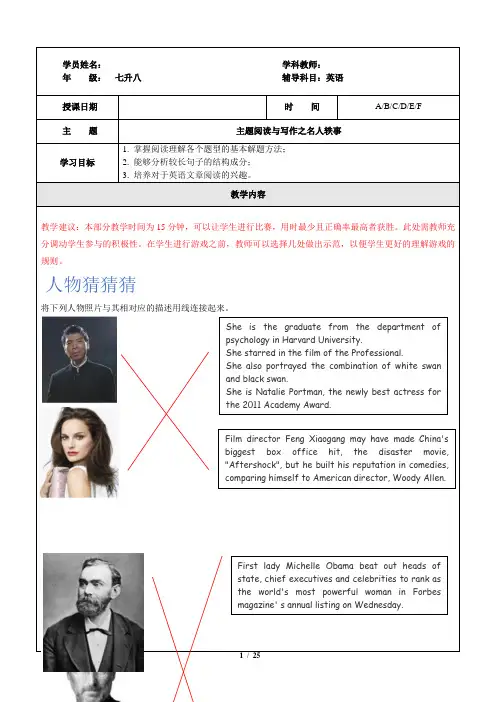
学员姓名:学科教师:年级:七升八辅导科目:英语授课日期时间A/B/C/D/E/F 主题主题阅读与写作之名人轶事学习目标1. 掌握阅读理解各个题型的基本解题方法;2. 能够分析较长句子的结构成分;3. 培养对于英语文章阅读的兴趣。
教学内容教学建议:本部分教学时间为15分钟,可以让学生进行比赛,用时最少且正确率最高者获胜。
此处需教师充分调动学生参与的积极性。
在学生进行游戏之前,教师可以选择几处做出示范,以便学生更好的理解游戏的规则。
将下列人物照片与其相对应的描述用线连接起来。
She is the graduate from the department ofpsychology in Harvard University.She starred in the film of the Professional.She also portrayed the combination of white swanand black swan.She is Natalie Portman, the newly best actress forthe 2011 Academy Award.Film director Feng Xiaogang may have made China'sbiggest box office hit, the disaster movie,"Aftershock", but he built his reputation in comedies,comparing himself to American director, Woody Allen.First lady Michelle Obama beat out heads ofstate, chief executives and celebrities to rank asthe world's most powerful woman in Forbesmagazine' s annual listing on Wednesday.人物猜猜猜Steve Jobs is a force of nature, a truly iconic manwhose quirks are nearly as famous as the products hesells. here are a few facts you may not have knownabout the enfant terrible of silicon valley.Alfred Nobel,the Swedish inventor and industrialist,was a man of many contrasts.教学建议:1.本部分设计时间为一小时,是教学环节的重点;2. 在课堂教学中,可先由教师结合讲义内阅读材料,向学生介绍本类型阅读文章的基本解题思路;3. 结合不同题型,教师分别介绍不同的解题思路以及易错点。
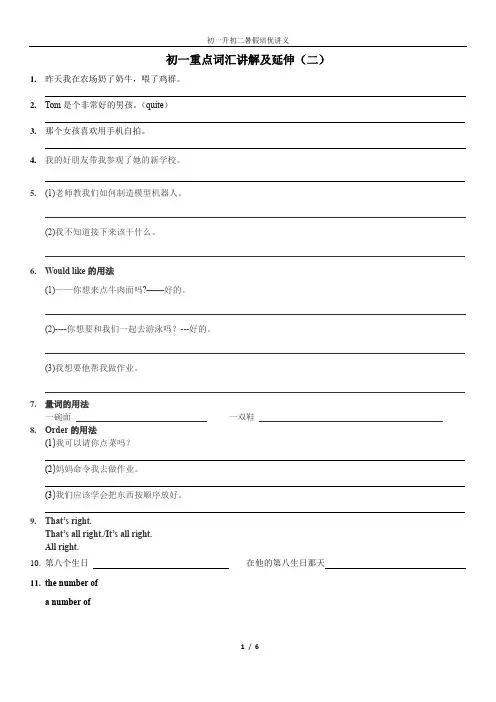
初一重点词汇讲解及延伸(二)1.昨天我在农场奶了奶牛,喂了鸡群。
2.Tom是个非常好的男孩。
(quite)3.那个女孩喜欢用手机自拍。
4.我的好朋友带我参观了她的新学校。
5.(1)老师教我们如何制造模型机器人。
(2)我不知道接下来该干什么。
6.Would like的用法(1)——你想来点牛肉面吗?——好的。
(2)----你想要和我们一起去游泳吗?---好的。
(3)我想要他帮我做作业。
7.量词的用法一碗面一双鞋8.Order的用法(1)我可以请你点菜吗?(2)妈妈命令我去做作业。
(3)我们应该学会把东西按顺序放好。
9.T hat’s right.That’s all right./It’s all right.All right.10.第八个生日在他的第八生日那天11.the number ofa number of12.wish的用法(1)我们通常在生日的时候回许愿吹蜡烛。
(2)最美好的祝愿!(3)妈妈希望我努力学习。
13.if的条件句如果你一口气把蜡烛全部吹灭的话,许的愿望便会成真。
14.cut upcut downcut off15.luck16.food17.我努力学习为了使我的愿望实现。
18.名词一、定义名词:指人或事物的名称。
二、名词的分类个体名词集体名词普通名词抽象名词按种类分物质名词专有名词专有名词:指特定的人、事物、地点、组织机构、概念等专有的名称。
专有名词首字母大写,前面不加冠词。
普通名词:指一般的人、事物、某种物质或抽象概念的名称。
前面可用a/an/the/零冠词。
个体名词:表示人或事物属于某一类。
集体名词:表示若干人或事物的总称。
family、class这类名词做主语时,如果表示一个整体谓语用单数形式,如果表示集体中的全体成员,谓语动词用复数形式。
抽象名词:表示动作、状态、品质、情况等抽象概念。
love物质名词:表示物质或者不具备确定形状和大小的个体事物。
fire、water三、名词的数:可数名词单数(c.n.单)前可加a/an可数名词按性质分可数名词复数(c.n.复)前不可加a/an不可数名词(u.n.)前不可加a/an可数名词单数变复数规则①规则变化A.一般在单数名词后加“s”,如map→maps,bag→bags等;B.以s,sh,ch,x结尾的词加“es”,如bus→buses,watch→watches等;C.以辅音字母+y结尾的词,变y为i加es,如baby→babies等;以元音字母+y结尾的名词,直接加s变复数,如monkey→monkeys,holiday→holidays,storey→storeys(楼层);D.以f或fe结尾的词,改f, fe为v再加es, 如half→halves knife→knives leaf→leaves wolf→wolves wife→wiveslife→lives thief→thieves特殊:下面名词直接加s, 如belief→beliefs roof→roofs safe→safes gulf→gulfscliff→cliffs handkerchief→handkerchiefs scarf→scarfsE.以o 结尾的名词直接加s:photo→photos ,piano→pianos,radio→radios,zoo→zoos特殊:potato→potatoes tomato→tomatoes,hero→heroes, Negro→Negroes(有生命的加es,无生命的加s)读音变化:一、加s的构词的复数:结尾是清辅音读[s],结尾是浊辅音或元音读[z]。

初一升初二暑假衔接班英语资料1班级______________ 姓名_____________第一部分:语法突破---动词不定式一、定义: 动词不定式又叫非谓语动词,在句子中不能做谓语,可作主语、表语、宾语、宾语补足语、定语和状语等句子成分;它由“to+动词原形”构成。
二、作主语如:To learn English is very important.不定式作主语常用_______来作形式主语,而将不定式移至谓语动词后作真正的主语。
如上句可表达为:___________very important ____________English.三、作表语如:My idea is ____________ him up at once.(call)四、作宾语:不定式用在及物动词后作宾语,常见的这类及物动词通常表示命令、打算或希望。
如like, learn, forget, remember, help, want, wish, decide, hope, plan, expect, wish等。
有些动词后面可加不定式,也可加_________作宾语,但意思不一样。
例如:remember to do sth. remember doing sth.forget to do sth. forget doing sth.stop to do sth. stop doing sth.try to do sth try doing sth五、作宾语补足语:a. ask, want, teach, tell, know, would like, allow等动词后面接动词不定式作宾语补足语。
如:The policemen asked him _____________ the bus.(get off)b. hear, see, look at, feel, watch, notice, listen to等动词后接不带to的动词不定式作宾语补足语。
1.上次课后巩固作业复习;2.以下英语句子是什么意思呢,比比看谁翻译的又快又好!第一名有奖品哦!教学建议:由于此部分是复习课,建议老师采取以教代学的方式让学生各自负责一个知识点进行讲解,其他学生进行提问。
老师在过程中进行补充和总结。
数词要点总结【知识梳理1】基数词习语:1.Rome was not built in one day. 罗马非一日建成2.to talk nineteen to the doze 喋喋不休:滔滔不绝3.one dog ,one bull 一兵对一卒;公平竞争4.at sixes and sevens 乱七八糟5.ten to one 十拿九稳6.Once bitten ,twice shy. 一朝被蛇咬,十年怕井绳夸张:1.Thanks a million. 非常感谢。
2.a good man in a thousand.千里挑一的好人3.One father can support ten children; tenchildren cannot support one father. 一父能养十子,十子难养一父。
4. A horse may stumble though he has four legs. 智者千虑.必有一失。
【解析】:注意一些会写错的基础词形式.3. ( ) How do we say “99,118” ?A. ninety-nine thousand and one hundred and eighteenB. ninety-nine thousands one hundreds and eighteenC. ninety-nine thousand one hundred and eighteenD. ninety-nine thousands and one hundred and eighteen【答案】C【解析】:基数词的读法。
注意:1,000以上数目的读法:自右向左每三位划一个分节“’”,第一个分节读thousand, 第二个分节读million, 第三个分节读billion或thousand million ,且hundred, thousand, million等用单数形式。
专项练习:一、根据句意,填出正确时态的动词短语。
(一)关于put的短语1. I __________ my hat and left the house.2. He __________ the fire.3.They __________ their tent in the middle of a field.4.Your room is untidy, __________ your things _______ .(二)关于take的短语1.When did the plane __________ ?2.It was very hot, so I __________ my hat.3.My job __________ most of my time.(三)关于give的短语1. I lent him some books last month and he ________ them ________ to me this morning.2.He ________________all his books to the library.3.He ________drinking a few years ago.4.Please ________________ the homework to the students.(四)关于call的短语1.I _________ the post office yesterday.2.I ____________ the doctor yesterday.3.I’ll __________you _______tomorrow.(五) 关于look的短语1.I am ________________my pen.2.Will you _________________the children for me please?e and ____________my photograph album.4. I _________________the window. It was dark outside.5.When you do not understand a word, you can ______ it _______in this dictionary.(六)关于pick的短语1.He ________ _______a coin when he was walk in the street.2.I'll ________you __________at the airport this evening.二、选出下列正确选项。
1、上次课后巩固作业复习;2、互动探索【教学建议】此环节设计时间在15分钟。
1.让学生抢答以下问题2.抢答又快又好的可以获得奖励1. Why do people go to bed?Because the bed won’t come to us.2. What’s the smallest room in the World?A mushroom.3. Which can move faster, heat or cold?冷和热谁跑得快?Heat,because you can catch cold.热跑得快,因为你追得上冷。
4. Why are dogs afraid to sunbathe? 狗为什么害怕日光浴?They don’t want to be hot-dog.综合复习与检测教学建议:此环节教案预期时间60分钟。
此部分采取优先选择权的激励方式,即:每个学生都必须回答三个问题的前提下,谁先选择谁就有自主选择权,后选择的学生只能选别人未选到的问题。
学生回答,老师做补充。
【知识梳理1】句型转换考点总结As...as和...一样By doing sth通过做某事so...that....如此...以至于...表示花费的动词之间的转换:spend,cost,pay, take比较级之间的转换:as...as , not so/as...as表示建议的表达法的互换:let's ,shall we , what about, how about , why not , why don't you教学建议:1. 包含预习下次课单词与短语和复习本次课内容两部分;2.要求学生30分钟内完成;可寻求家长督促;3. 要求学生对不确定有疑问的题目做标记;4.下节新课前让学生相互批改表扬正确率最高的学生;5.让作对的学生给做错的学生讲题,老师进行补充;6.老师对错误率较高的题目相关的知识点进行复习。
初一升初二暑假培优讲义初一重点词汇讲解及延伸(一)1.by的用法(1)上周末我们在河边露营。
(2)我明天乘公交车去学校。
2.play的用法(1)踢足球/打篮球/打羽毛球/打乒乓球/打排球/打棒球/打网球(2)弹钢琴/弹吉他/拉二胡/吹笛子(3)下象棋(4)我喜欢与小孩子一起玩。
3.时间的表达法(1)在2018年在2018年7月在2018年7月9日(2)在早上/中午/晚上在2018年7月9日的早上在星期六的早上(3)在星期一/星期二/星期三/星期四/星期五(4)在春天/夏天/秋天/冬天(5)在正午/晚上在一个晴朗的晚上(6)上一周/下个月/今天早上/那天4.For 的用法(1)我喜欢把面包和牛奶作为早餐。
(2)让我为你捡起来。
(3)我早晨通常跑步一小时。
(4)我们出去散步吧。
(5)我来这儿取书包。
(6)我花了20元买这本词典。
1 / 3初一升初二暑假培优讲义5.评价的句型——你周末过得怎样?——很好。
6.with的用法(1)玛丽嫁给一个很有钱的男人。
(marry)(2)那个金发的女孩很漂亮。
(3)我用小刀削平果。
(4)这个老人与小狗住在一起。
7.kind of/a kind of/all kinds of/different kinds of/what kind of8.that’s why 和that’s because 辨析(1)我们今天没有出去。
那是因为天气太热了。
(2)现在的工作很难找。
那是为什么我们要如此努力学习。
9.it’s + adj. + for/of sb. + to do sth.句型(1)对我来说,学习英语好难。
(2)你真是太好了,帮助我学习英语。
10.the+序数词/a+序数词第三个再一个(共三个)11.keep+n.+adj. 使····怎么样我们应该保持教室的干净。
12.let sb do sth让我们一起去购物吧。
13.see/watch sb doing/do sth14.感叹句的用法(1)多可爱的一只小狗!(2)多善良的父母!2 / 3(4)这是一个多有用的建议!15.so````that```/such```that````/too````to````/```enough``to```这个人如此的老以致于他无法搬动这个箱子。
1.在阅读中积累词汇短语及句型表达;培养学生理解和运用语言能力的基本方法;2. 理解文章的整体情感和文化背景, 灵便迁移阅读信息到写作表达中去。
3.培养学生的阅读兴趣。
1. 浏览下图,让学生用英文简单地描述图片;2. Speaking contest:My school life让学生说出表达自己的观点,言之有理,能自圆其说即可。
Keys:play football Keys:have classKeys:play basketball Keys:do handwork1. 要求学生在限定时间6 分钟内完成阅读;2. 让学生之间相互对答案;3. 鼓励学生自己解释和别人答案不同的题目以便老师了解学生的解题思路及错误原因;4. 让错误较多的学生总结错误原因及注意事项。
5. 短语及句型学习1)细节与事实:往往考查事件发生的时间、地点、人物、发展过程和结局等。
2)结论或者推论:答案往往无所谓正确与错误之别,而是须读懂通篇文章,弄懂作者的写作要旨,按照文章的内容和逻辑关系,做出符合原文逻辑或者主旨的结论或者推论。
1)客观信息的答案普通都可以在原文中找到。
在答题时要子细核对原文,注意问题的人称、时态和语态与原文是否一致,如果答题时需要语言重组,则应尤其谨慎。
2)开放性的问题源于文章,答题时不能天马行空,要符合逻辑。
语言不宜过于复杂,能说明观点即可。
Keep computers in a common area so you can what your kids are doing. It's a long standing directive for online safety —but one that's quickly becoming moot as more young people have mobile devices, often with Internet access.A new report from the Pew Internet & American Life Project finds that 78 percent of young people, ages 12 toThe survey, released Wednesday, finds that one in four young people say they are "cell-mostly" Internet users, a percentage that increases to about half when the phone is a smart phone. In comparison, just 15 percent of adults said they the Internet mostly by cellphone."It's just part of life now," says Donald Conkey, a high school sophomore inWilmette, Ill., just north of Chicago, who is among the many teens who havesmartphones. "Everyone's about the same now when it comes to their phones —they're on them a lot."He and other teens say that if you add up all the time they spend using appsand searching for information, texting and downloading music and videos, they'reon their phones for at least a couple hours each day —and that time is onlyincreasing,According to the survey, older teen girls, ages 14 to 17, were among the most likely to say their phones were the primary way they access the Web. And while young people in low-income households were still somewhat less likely to use the Internet, those who had phones were just as likely —and in some cases, more likely —to use their cellphones as the main way they access the Web.It means that, as this young generation of "mobile surfers" grows and comes of age, the way corporations do business and marketers advertise will only continue to , as will the way mobile devices are monitored.Already, many smartphones have restriction menus that allow parents to block certain phone functions, or mature content. Cellphone providers have services that allow parents to see a lot of their children's texts. And there are a growing number of smartphone applications that at least to give parents some level of control on a phone's Web browser, though many tech experts agree that these applications can be hit-or-miss.Despite the ability to monitor some phone activity, some tech and communication experts question whether , alone, is the best response to the trend.Some parents take a hard line on limits. Others, not so much, says Mary Madden, a senior researcher at Pew who co-authored the report."It seems like there are two extremes. The parents who are really locking down and monitoring everything —or the ones who are throwing up their hands and saying, 'I'm so overwhelmed,'" Madden says.在该句中,a share 是nearly half of those 的同位语,其后面带了两个定语从句,即“that's increasing steadily”和“that's h aving a big effect on…”, 先关系代词that 在定语从句中均作主语。
初一升初二暑假衔接班英语资料3班级______________ 姓名_____________第二部分:新知速递Important words and phrases1.talented2. care3. laugh4. serious5. as long as necessary7. in fact 8. share 9. similar 10. be different from单项选择:( ) 1. She is talented music but I am good sports.A. in, atB. at, inC. at, atD. in, in( ) 2. Li Hua’s shoes are as _______ as Zhang Hui’s.A. cheapB. cheaperC. the cheaperD. cheapest( ) 3. It’s very easy for him me laugh.A. to makeB. makingC. makesD. made( ) 4. _________you don’t give up,your dreams will come true.A. As long asB. ForC. AndD. Or( ) 5. If you want to be a student helper, please call him 443—5667.A. atB. inC. ofD. on( ) 6. This is my friend. He is outgoing than I am.A. very muchB. much moreC. moreD. very( ) 7. Mr Bean enjoys jokes and often makes us .A. to tell, to laughB. tells, laughC. telling, laughD. telling, laughing( ) 8. Lily’s books are _______than ours.A. newB. newwerC. newerD. the newer( ) 9. —Let’s go shopping at the new mall.—Why not shop online? It’s ______.A. expensiveB. more expensiveC. Less expensiveD. less cheapest( ) 10. Someone says “Time is money.”But I think time is_________ important than Money.A. leastB. MuchC. even moreD. much least( )11. We can get _________on the Internet.A. many informationsB. much informationsC. many informationD. much information( )12. This question is not _____ that one.A. as easier asB. so easy thanC. as easy asD. as easy to( )13.Jack ran ____ faster than the others at the sports meeting.A. tooB. muchC. soD. very( )14. I think your story is ____ his.A. so interesting asB. as interesting asC. much intersting thanD. less funny than( )15. I don’t think you should laugh ___ the old man. ---- Sorry.A. withB. afterC.forD. at二.介词短语作后置定语介词短语作定语时,总是放在所修饰的名词后面,形成后置定语。
2018暑假七升八补习资料一、冠词和be动词的用法一、26个字母和冠词a, an,the的用法和练习1、26个字母:①元音字母:(_____个)____________________________________________________②辅音字母:(_____个)2、冠词a, an,the的用法:不定冠词(a/an):①在第一次提到表示非特指的人或物的可数名词前。
②在可数单数前,表一类事物定冠词(the):①第二次提到的人或物的名词前(表示特指)②表示世界上独一无二的东西;③序数词、形容词和副词最高级前;乐器名称前;专有名词前【配套练习】一、用a, an, the填空或者可以不填。
1. I have ________ book. It is ________ English book. ________ English book is red.2. --Do you like playing ________ football? --Yes. But I have only ________ basketball.3. Which is bigger(更大的), ______sun or ______moon?4. There's ________ "u" and ________ "s" in ________word "use".5. Alice likes playing ______ piano.6. There is _______ house in the picture. There is ________old woman near_________house.7. There are four seasons in _______year. ________ first season is spring.8. ______bag on ______desk is mine.9. Do you know _______girl in _______room?10. ________ Greens are traveling in _________ South China.二、单项选择( ) 1. I read ______story. It is ______interesting story.A. a, anB. a, aC. the, theD. /, an( ) 2. Britain is _______ European country and China is _______ Asian country.A. an, anB. a, aC. a, anD. an, a( ) 3. --Where do you usually have ______ lunch? --At home.A. aB. anC. theD. /( ) 4. _____elephant is bigger than ______ horse.A. /, /B. an, aC. An, aD. /, the( ) 5. We always have ______rice for ______lunch.A. /, /B. the, /C. /, aD. the, the( ) 6. It's ____ exciting way to shop on the Internet.A. aB. anC. theD. /( ) 7. ____ girl over there is ____ English teacher.A. The, anB. A, /C. The, /D. A, a( ) 8. There is ____ picture on ____ wall. I like ____ picture very much.A. a, the, theB. a, the, aC. the, a, aD. a, an, the( ) 9. January is ______first month of the year.A. aB. /C. anD. the二、Be动词(am,is,are)的用法口诀:I用am,you用are,is连着他(he)她(she)它(it)。
单数统统用is,复数一律用are。
变疑问,往前提,句末问号莫丢弃,变否定,更容易,be 后not莫忘记,疑问否定任你变,句首大写莫迟疑。
注意:be动词通常会和其他词连写在一起,如:I'm,what's,name's,they' re等。
【配套练习】一、用适当的be动词填空1. I _______ from the U.S.A.2. The boy ________ twelve years old.3. She ________ my good friend.4. They ________ in England.5. My mother’s pet ________ a cat.6. Her uncle ________ a doctor.7. Maria and Jane ________ not from China. 8. ________ the woman your aunt?9. ________ the trees green? 10. It ________ a cute panda.11. What ________ wrong with you? 12. Where ________ these girls from? 13. How much ________ those eggs? 14. Whose hamburger ________ this?15. My name ________ Li Ming. 16. He ________ kind to the students.17. Li Lei and I ________ students. 18. Excuse me, ____ that Class 3, Grade 1?19. I’m glad to ________ here.20. The girls ________ in pink skirts.21. What ________ white and black? 22. Mom, this ___ my teacher, Mr. Lee.23. His QQ number ________ 85663211. 24. Tom with his friends ________ at home.二、单项选择题( ) 1. - Is his father fine? - No, he ________.A. am notB. isn’tC. aren’tD. be not( ) 2. How old ________ the young men?A. amB. isC. areD. be( ) 3. – What ________ up? - Sorry, I don’t kn ow.A. amB. isC. areD. be( ) 4. - Is your pen pal from the U.S.A.? - ________ .A. Yes, he isn’t.B. Yes, she are.C. No, he is.D. No, he isn’t. ( ) 5. - ________ you David? - Yes, I ________.A. Are; areB. Am; amC. Are; amD. Are; is( ) 6. - Is this an eraser? - ________ .A. Yes, this’s.B. Yes, this is.C. Yes, it is.D. Yes, it’s.【拓展练习】把下列句子改成否定句和一般疑问句。
1. This is the reading room.否定句:______________________________________________________________一般疑问句:___________________________________________________________2. She’s Miss L in.否定句:______________________________________________________________一般疑问句:___________________________________________________________3. I am in Grade 3.否定句:______________________________________________________________一般疑问句:___________________________________________________________4. These are pears.否定句:______________________________________________________________一般疑问句:___________________________________________________________5. We are teachers.否定句:______________________________________________________________一般疑问句:___________________________________________________________6. Miss Zhang is our English teacher.否定句:______________________________________________________________一般疑问句:___________________________________________________________二、名词的用法一、指示代词。
二、英语里的名词从数方面上分为可数名词和不可数名词两大类,可数名词有单数与 复数之分,而不可数名词如抽象名词,物质名词就没有复数形式。
句中出现复数名词,其他成分如代词,动词也要与其相配合。
修饰可数名词:不定冠词(a, an),数词many, (a)few, several, a number of 修饰不可数名词:much, (a)little, a great deal of 共同的:some, all, a lot of, lots of可数名词复数的构成方法: 1. 一般在名词后加-s :dog →dogs 2. 以s, x, sh, ch 结尾的名词加-es :watch →watches3. 以辅音字母+y 结尾的名词改y 为i 再加es :country →countries4. 以o 结尾的名词,加-s 或-es :potato →potatoes, tomato →tomatoes5. 以f, fe 结尾的名词,改f, fe 为v 加-es :knife →knives . 需要记忆的特殊复数形式复合词的复数:改中心词为复数 girl student →girl students一张纸 a piece of paper,一条建议 a piece of advice,一条新闻 a piece of news,一瓶墨水 a bottle of ink,一碗米饭a bowl of rice,一杯啤酒a glass of beer,一公斤盐a kilo of salt 三、单数变复数后s, es 的读音:1) 元音,浊辅音后读 /z/,如:days /deiz/,games /geimz/,flags /flægz/ 2) 清辅音/p/, /k/, /f/ 后读 /s/,如:maps /mæps/,books /buks/ 3) /t/后读/ts/,如:cats /cæts/4) /d/后读/dz/,如:goods /gudz/ /s/, /z/, /∫/, /t ∫/后读/iz/,如:matches /’mæ t ∫iz/ 1. 写出下列可数名词的复数形式。